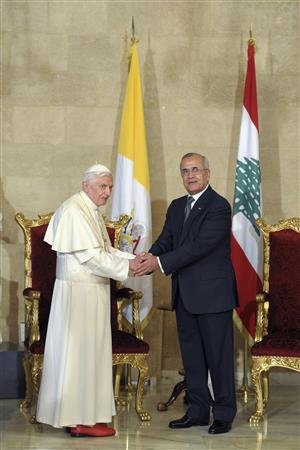BEIRUT: A culture and arts festival will open the typically off-limits Horsh Beirut Park free to the public for nearly two weeks, organizers and the Beirut mayor announced Tuesday. Candy and popcorn stands and theater stages will be set up around the pine-tree-lined park for the festival, which starts Thursday and will run until […]
CORPUS CHRISTI, TX (Catholic Online) – Pope Benedict XVI’s apostolic journey to Lebanon is now complete. Let us hope that it bears fruit. Pope Benedict XVI’s apostolic journey had two audiences: the people of Lebanon generally–which would include the significant Muslim population–and the Christian faithful in Lebanon. Pope Benedict XVI’s message was therefore two-pronged. The first message was aimed at the entire population of Lebanon, and it may be best summarized in the Pope’s address to the assembled government and religious leaders at the Baabda Presidential Palace. The essential message was peace. He expressed the hope that Lebanon may become for the world "an example," a "witness" that "every man and woman has the possibility of concretely realizing his or her longing for peace and reconciliation." Peace, not violence, is "part of God’s eternal plan," and it is "impressed . . . deep within the human heart."
In invoking the "eternal plan" of God as found "deep within the human heart," Pope Benedict XVI is referencing the natural moral law which is found in human nature and which is nothing less than the way human beings participate in the eternal law of God. It is something that is found within us and is something that can be accessed by reason without necessarily having to have recourse to revelation The Pope, of course, knows that what the Christians accept as revealed and what the Muslims accept as revealed are greatly at odds, and so it cannot be the basis of a common life.
What can be the basis of a common life is a unity based upon human nature, a "unity" which is not, however, "uniformity." One of those areas of "unity" is the desire to build peace, the "first school" of which is the family. Respect for human life–the rejection of violence–is essential for peace. "If we want peace, let us defend life!" This, of course, necessarily means the rejection of any "assault on innocent human life," but, more broadly, also a rejection of "war and terrorism." All human beings share in a common nature, and this is a great truth which must be recognized. "Wherever the truth of human nature is ignored or denied," the Pope continues, "it becomes impossible to respect that grammar which is the natural law inscribed in the human heart." It is the natural law, the "grammar" of man which is found in his human nature, which allows men and women of different faiths to speak a common language. It allows human beings who have different world views nevertheless to "coexist," even flourish, in building a common society. Without acknowledgement of the natural law, it "is impossible to build true peace."
Human nature has an "innate yearning for beauty, goodness, and truth." This yearning reflects the fact that we are made in the image of God and so each of us is, in a manner of speaking, "a reflection of the divine." This yearning for beauty, goodness, and truth is "the basis for a sound and correct notion of morality, which is always centered on the person." The natural law found within our human nature is a corrective to "widespread opinions, the fashions of the moment, or forms of political and religious ideology" which may be false. There is a clear, if disguised rejection, of any sort of doctrine of jihad. "Thoughts of peace, words of peace, and acts of peace," and not thoughts of jihad, words of jihad, and acts of jihad, are required if any sort of reconciliation and common life is to be expected.The Pope, of course, encourages dialogue between Christianity and Islam, but he also recognizes that the only basis for such dialogue demands that the participants become "conscious of the existence of values which are common to all great cultures because they are rooted in the nature of the human person."





